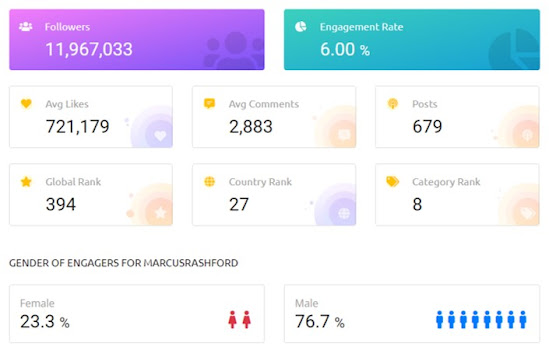The second part of our OSP Marcus Rashford case study focuses on Audience and Industry.
This completes our in-depth study of Marcus Rashford's online presence and brings in important questions about social media and regulation.
Audience
Target audience: demographics and psychographics
What is Marcus Rashford’s target audience:
- Demographics: CAGE?
- Psychographics?
Audience engagement
Instagram engagement rate is a measure of how much audiences engage with posts (e.g. likes, comments). An engagement rate of 1-3% is considered good and anything 6%+ is extremely high.
Marcus Rashford’s power as an influencer is shown by his engagement rate of 6%.
Source: https://starngage.com/app/gb/influencers/marcusrashfordMarcus Rashford's appeal to audiences
What is the appeal of Marcus Rashford to his audience? Think about his campaigns, use of social media and his website. Also, consider his appeal to different audiences.
Use Blumler and Katz Uses and Gratifications theory:
- Diversion
- Personal Identity
- Personal Relationships
- Surveillance/information
Industry
Marcus Rashford net worth
Marcus Rashford’s net worth has been estimated at around £16m (source: Sunday Times rich list). This includes:
- £200,000 per week from Manchester United (£10.4m a year)
- £2m endorsement deal with Nike
- Additional deals with Burberry, BT Sport, Coca-Cola and others
He is also the youngest person to top the Sunday Times Giving List for raising £20m for good causes.
Watch the following promotional videos from brands featuring Marcus Rashford.
- What do the companies get from an association with Rashford?
- Thinking about media language, how do these adverts create an emotional connection between the brand and audience using Marcus Rashford?
- How do the clips help Marcus Rashford control or build his own brand?
Industries: ownership, control and regulation
- Twitter was started by Jack Dorsey in 2006. It now has over 200 million active users worldwide.
- Twitter’s 2020 revenue was $3.72 billion.
- Twitter makes most of its money through advertising – promoted tweets or ‘trend takeovers’.
- Marcus Rashford has over 5m Twitter followers.
- Instagram is an image and video sharing site launched in 2010.
- In 2012 it was bought by Facebook for $1 billion. Facebook and Instagram’s parent company is now called Meta – a global conglomerate.
- Instagram has over a billion active users worldwide and more than 25 million users in the UK alone.
- Instagram revenue in 2020 was $24 BILLION.
- Marcus Rashford has over 12m Instagram followers.
- Over 40% of Instagram users are aged under 23.
- Research suggests that Instagram is damaging to mental health – particularly for teenage girls.
- Facebook’s own research suggested this – but they allegedly kept this secret.
- The research suggested one in three girls felt bad about their bodies and Instagram made this worse. It is also linked to increased anxiety and depression.
The government put forward the Online Safety bill in 2022 to change the law and add regulation of the internet to Ofcom’s role as media regulator. This includes:
- Sending threatening posts being punishable by jail sentences.
- Platforms like Twitter and Instagram having to actively prevent users seeing harmful material – or risk being fined by Ofcom.
- Platforms paying Ofcom to regulate their content.
Finally, here is Marcus Rashford talking to Sky Sports News about what should be done about online abuse:
Blog tasks: Marcus Rashford - Audience and Industry
Work through the following tasks to complete your work on Marcus Rashford's online presence:
Audience
1) Who are the potential target audiences for Marcus Rashford's online content? Try and cover both demographics and psychographics.
2) Marcus Rashford’s online presence is partly driven by his excellent use of social media. How does he use social media to engage with his fans and make them feel part of his brand?
3) What is Marcus Rashford's Instagram engagement rate and what does this tell us?
4) Go to Marcus Rashford's Twitter or Instagram account. Find and screenshot/link three tweets/posts that show the different aspects of his brand e.g. Relatable person (normal, down to earth), Campaigner (interested in politics), Celebrity footballer (e.g. awards ceremony or fashion).
6) Applying Stuart Hall's Reception theory, what would a preferred and oppositional reading of Marcus Rashford's online presence be?
- Preferred reading (people who love Marcus Rashford):
- Oppositional reading (people who criticise Marcus Rashford):
Industry
1) What is Marcus Rashford's net worth and how does his online presence help him to make money?
2) What charities and companies/brands is Marcus Rashford associated with? Why might they want to be linked to the Rashford brand?
3) Research Twitter and Instagram. Who owns the companies, how do they make money and how much profit did they make last year?
4) What are the worries about Instagram’s negative effects?
5) How do social media platforms manage online abuse on their platforms and why has Marcus Rashford drawn attention to this? How might this change in the future?
6) What happened by law in 2022 that changed the way the internet is regulated? Write three changes that this new law may bring in and explain why it is difficult to regulate the internet.
Extension tasks
How does Marcus Rashford's online presence reflect modern society and culture?
Read this Sky Sports interview with Marcus Rashford saying online abuse should be easier to stop. What does he think the companies should be doing to regulate it?
If you want to test yourself at A Level or even degree level, try reading this chapter from A Level Media theorist Clay Shirky called Publish, Then Filter. How does Shirky suggest the internet has changed the way we engage with the media?



No comments:
Post a Comment